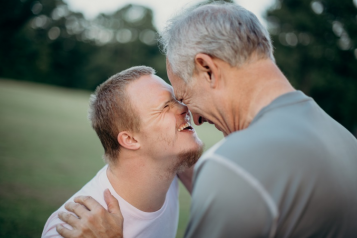Tackling disability hate crime
The five Partnership Boards represent local people who use adult social care services - including those with physical and learning disabilities and sensory impairments.
And later this week - on Wednesday, 18 October - they are running a special Round Table event on disability hate crime.
The aim is to
- Share information and experiences of hate incidents and crime
- Explain how to report hate incidents
- Highlight support for anyone affected
- Encourage local police, councils, support and community groups to work together to tackle disability hate crime.
In a personal capacity, I'm also Chair of the Board of Trustees at national charity Stop Hate UK, which supports people affected by all forms of hate crime – disability, race or ethnicity, religion or belief, and sexual orientation.
And this week we want to raise awareness of hate crime and make Cambridgeshire and Peterborough #NoPlaceForHate.
What is a hate crime?
Hate crimes are any crimes that are targeted at a person because of hostility or prejudice towards that person’s:
- Disability
- Race or ethnicity
- Religion or belief
- Sexual orientation
- Transgender identity
Hate incidents can include
- Verbal abuse like name-calling and offensive jokes
- Harassment
- Bullying or intimidation by children, adults, neighbours or strangers
- Physical attacks such as hitting, punching, pushing, spitting
- Threats of violence
- Hoax calls, abusive phone or text messages, hate mail
- Online abuse for example on Facebook or Twitter
- Displaying or circulating discriminatory literature or posters
- Harm or damage to things such as your home, pet, vehicle
- Graffiti
- Arson
- Throwing rubbish into a garden
- Malicious complaints for example over parking, smells or noise.
Communities affected by hate crime in our area
- People with physical and learning disabilities
- People of faith or no faith
- People from different races including the Roma Gypsy Traveller communities
- The LGBTQ+ community
The impact
Some of our Board members have experienced hate crime themselves because of their disability or because they care for someone with a disability.
There can be serious, physical effects from violent attacks. But verbal abuse also leaves psychological and emotional scars and victims can be fearful, withdrawn and socially-isolated.
Please report incidents
Most hate crimes are unreported - victims are often reluctant to go to the police.
Even if you don’t want police to take action, or think the incident is too small to report, passing on the information to them helps build evidence of issues in our area.
Support
There is free, confidential support and advice to anyone who has experienced or witnessed hate crime.
In Cambridgeshire and Peterborough, contact the Victim & Witness Hub on 0800 781 6818. It’s currently open from 9am to 6pm Monday to Friday and 9am to 5pm on Saturdays.
The team can help you access specialist services and provide emotional and practical support.
How everyone can challenge hate crime
Report it to the police by calling 999 in an emergency or 101 in other situations.
You can also report hate crime online via the True Vision website that will send your report to the relevant police service.
If you don’t want to call the police, you can contact Stop Hate UK.
Visit the website
0800 138 1625
Text 07717 989 025.
People who are deaf, or have speech or hearing impairments can use text relay 18001 0800 138 1625.
If you witness a hate incident, show your support by sitting with the person targeted – if you are able to. Do not put yourself at risk.
Block offensive social media posts and report them to platform moderators.


